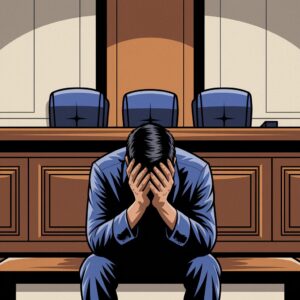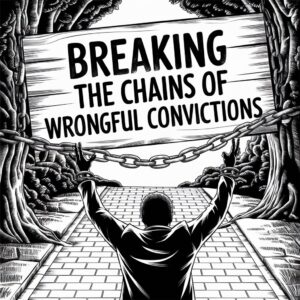Breaking the Chains of Wrongful Convictions
Introduction: A Justice System in Crisis
Every year, countless individuals are caught in the intricate web of the justice system, accused and sometimes convicted of crimes they did not commit. Wrongful convictions are not just errors; they are miscarriages of justice that have devastating consequences for individuals, families, and communities. Civilian City, a nonprofit organization, is dedicated to addressing this issue head-on through its pro bono legal services. This blog delves into the problem of wrongful convictions, the organization’s pivotal role in rectifying these injustices, and the broader implications of their work.
Understanding Wrongful Convictions
A wrongful conviction occurs when an innocent person is found guilty of a crime they did not commit. This can result from a variety of systemic failures, including:
- Mistaken Eyewitness Testimony: Human memory is fallible, and eyewitness misidentifications remain one of the leading causes of wrongful convictions.
- Coerced Confessions: Under pressure, individuals may confess to crimes they did not commit, especially if unaware of their rights.
- Inadequate Legal Representation: Public defenders are often overburdened and underfunded, leaving some defendants without proper legal defense.
- Faulty Forensic Evidence: Misinterpretation or misuse of forensic science can lead to incorrect conclusions.
The Role of Civilian City in Fighting Wrongful Convictions
Civilian City’s mission is rooted in the belief that justice should be accessible to all, regardless of socio-economic background. Here’s how the organization contributes to addressing wrongful convictions:
1. Free Legal Aid
Civilian City provides pro bono legal assistance to individuals who cannot afford private representation. Their team of dedicated lawyers conducts in-depth reviews of cases, identifying flaws and gathering new evidence to build a strong defense.
2. Post-Conviction Advocacy
For those already convicted, the organization engages in post-conviction advocacy, seeking to overturn unjust verdicts. This includes filing appeals, presenting new evidence, and working with forensic experts to challenge questionable findings.
3. Collaboration with Innocence Networks
Civilian City partners with national and local innocence networks to maximize resources and expertise. These collaborations help ensure that no stone is left unturned in the fight for justice.
4. Public Awareness Campaigns
Education is a crucial component of reform. Through seminars, social media campaigns, and community workshops, Civilian City raises awareness about the causes and consequences of wrongful convictions, urging systemic change.
Real-Life Impact: Stories of Hope
Case Study: The Freedom of John Doe
John Doe spent 15 years behind bars for a crime he did not commit. Convicted based on faulty eyewitness testimony, he lost precious years of his life. Civilian City took up his case, re-examined the evidence, and identified inconsistencies in the original investigation. With new DNA evidence, they secured his exoneration. Today, John is rebuilding his life, a testament to the organization’s relentless pursuit of justice.
Systemic Reform: Beyond Individual Cases
While rectifying individual cases is vital, Civilian City also works to address the root causes of wrongful convictions. Key initiatives include:
1. Policy Advocacy
The organization lobbies for legislative changes to improve the justice system, such as:
- Mandatory recording of interrogations to prevent coerced confessions.
- Reforming forensic practices to eliminate reliance on unvalidated science.
- Establishing compensation frameworks for exonerees to rebuild their lives.
2. Training for Legal Professionals
By training attorneys, judges, and law enforcement officers on the pitfalls of wrongful convictions, Civilian City fosters a culture of fairness and accountability within the justice system.
The Emotional Toll of Wrongful Convictions
Wrongful convictions extend beyond the individual to their families and communities. The emotional toll includes:
- Loss of Trust: Families may lose faith in the justice system.
- Economic Hardship: Exonerees and their families often face financial difficulties, having spent years unable to work.
- Social Stigma: Even after exoneration, many face societal stigma and struggle to reintegrate.
Civilian City’s holistic approach addresses these challenges, offering counseling and support services to help individuals and their families heal.
How You Can Support the Cause
Civilian City’s fight for justice is fueled by the support of compassionate individuals and communities. Here’s how you can contribute:
1. Volunteer Your Time
Legal professionals, students, and advocates can volunteer with Civilian City, providing crucial support to their mission.
2. Donate
Every contribution helps fund investigations, legal representation, and support services for individuals fighting for their freedom.
3. Spread Awareness
Sharing stories of wrongful convictions on social media or within your community helps build momentum for systemic reform.
A Vision for the Future
Civilian City envisions a world where justice prevails for everyone, regardless of socio-economic status. Their work is a testament to the power of collective action in creating a fair and equitable society.
Conclusion: Hope in Action
Wrongful convictions are a stark reminder of the imperfections in our justice system. However, organizations like Civilian City shine as beacons of hope, proving that change is possible. Through pro bono legal aid, systemic advocacy, and community support, they are not only freeing the innocent but also paving the way for a more just society.




